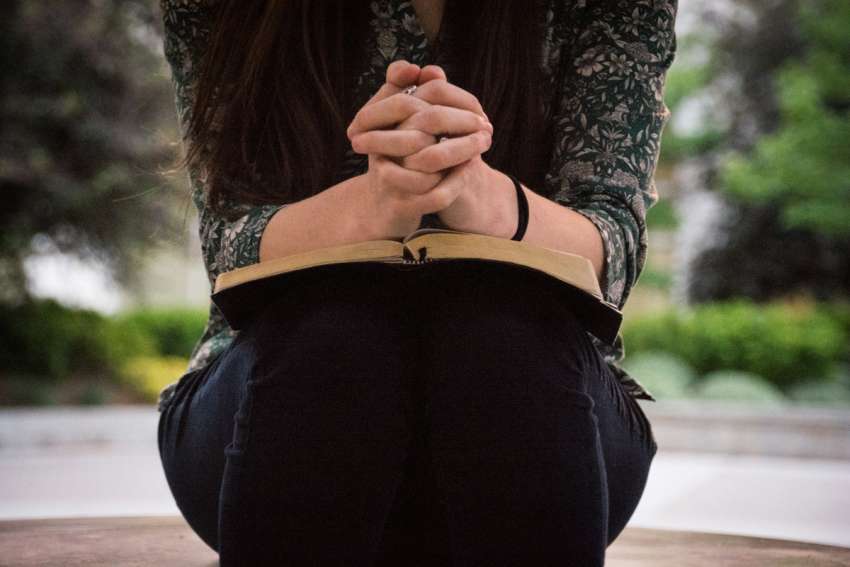My brother, on the other hand, expresses his fondness for moving day. He likes the way it gathers us in to one place, doing one thing, for one concentrated day — without need of decisions about where, why, when and with whom to spend our time. There’s a kind of multi-dimensional oneness to it.
For some, being part of “one,” whether it’s one group or activity, might produce anxiety as to a threat, for others resentment as to an imposition. Sometimes, though, the experience of “oneness” evokes joy, even amidst hardship, like the gasp of awe when we glimpse hundreds of birds moving in one fluid, unplanned, exquisite wave. It’s the joy of oneness that can open us up to the many, now not frightening or lonely, but beautiful and invitational, giving us a place to stand rather than threatening to take it away.
The oneness of God, on
which everything rests, is at the heart of it all. Because God is one, we can discover that we are not isolated units doomed to eternal loneliness, as in C.S. Lewis’ vision of hell as the place where people keep moving farther and farther away from each other. God’s oneness does not make us “one” in the sense of a fortress that keeps some in and most out, an elite spe- cial-interest club where we decide the membership while keeping ourselves apart, or one group among others. Because God is one, we can be gathered together into
one without losing our uniqueness. Our faith is in one God, or we might say, the oneness of God. The Nicene Creed begins this way: “I believe in one God.” One God is the beginning of everything. This oneness doesn’t mean one in number, like buying one ticket instead of 12. It’s not an expres- sion of faith in “this” God rather than the others, as though we were choosing between Zeus and Apollo, or Mother Earth and Sister Moon. It’s an expression of our faith that God is singular, unique, only. “I believe in one God” because there is no other. Only in God is being. To have faith in God’s oneness is to
enter into reality. It’s reality, but it’s a matter of
faith. Why is this? Because we could not know God’s oneness unless God had shown it to us. God is known to us because He chooses to show Himself, bursting into our daily existence. Even for us humans, we can’t be known by another unless we choose to reveal ourselves to someone.
God walked with the Israelites for millennia to give them this
reality that He is one-in-being, in a way they could take in. The one, singular, unique God revealed Himself in history to Abraham, Jacob, Moses, Elijah, and through them to the whole people, the people of Israel whom He chose to receive and carry this revelation of Himself.
This is why the whole history of faith is about coming to know — thanks to God showing us — that God is one. The Creed must begin with this word, because we can’t understand anything else without resting on this. It has echoes and traces everywhere, which we have the capacity to recognize and see that nothing can be understood without it. God alone is God. The word “God” itself is a kind of placeholder for the oneness God has revealed to us, which we could never discover on our own, but have been freely given so that we can live and flourish. Because God is one, and invites us to share it, we are inextricably linked to each other and (in a different way) to the rest of creation, from the glorious stars to the inglorious centipede.
How can we bear St. Paul’s “many parts in one body” if we don’t experience oneness? Without it, we would lose our minds. With it, which is to say with faith in God’s self-revelation, we can come to our senses. There is no choice among gods; there’s a choice of the one, unique, only God or else no God, which means, nothingness. It’s how there can be, and why we know there is, one faith and one baptism, one Church and one Body of Christ: because there is the Father almighty, the Lord Jesus Christ, the Holy Spirit giver of life, one God.
In Father and Son and Spirit we do not have one-third and one-third and one-third adding up to one; we have one God, who loves to show us what oneness really is, and invite us to share in it. And so we can come into communion with one another, which opens us to joy. We learn to dance with one another God’s dance, sing with one another God’s song, love one another with God’s love.
(Marrocco can be reached at mary.marrocco@outlook.com.)


